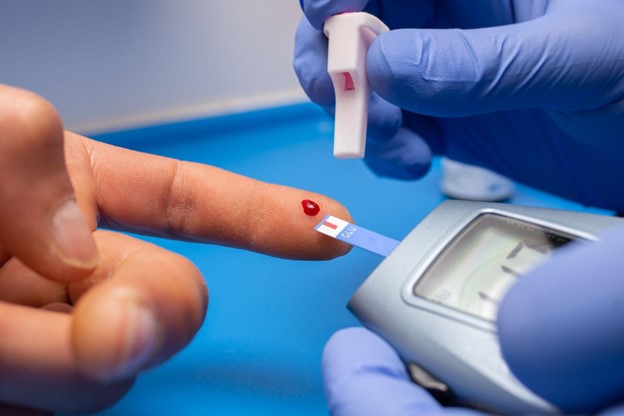Last updated on April 8th, 2025 at 05:07 pm

The random blood sugar normal range typically falls between 70 and 140 milligrams per deciliter (mg/dL), this range provides a snapshot of blood glucose concentration at any given time, without the need for fasting. The normal range for random blood sugar levels serves as a critical benchmark in assessing an individual’s immediate glucose regulation. Maintaining blood sugar within this range is indicative of effective glucose control and a lower risk of diabetes-related complications.
Monitoring random blood sugar levels is essential for early detection of potential issues, allowing for timely intervention and lifestyle adjustments. Understanding this normal range is pivotal in promoting overall health and well-being, enabling individuals to make informed decisions about their diet, exercise, and overall lifestyle choices. Regular monitoring, along with consultation with healthcare professionals, ensures proactive management of blood sugar levels for long-term health.
Normal Range
Random blood sugar, also known as casual blood glucose, measures the glucose levels in your blood at any given time, regardless of when you last ate. Unlike fasting blood sugar tests, which require you to abstain from eating for a specific period, random blood sugar tests provide a snapshot of your blood sugar levels without any prior fasting.
The normal range for random blood sugar levels can vary slightly between individuals and may be influenced by factors such as age, health conditions, and lifestyle. However, in general, a random blood sugar level between 70 and 140 milligrams per deciliter (mg/dL) is considered normal for most people.

- Normal Range (70-140 mg/dL): A random blood sugar level within this range indicates that your body is effectively regulating glucose, and your risk of developing diabetes or related complications is relatively low.
- Elevated Levels (140-200 mg/dL): If your random blood sugar levels consistently fall within this range, it may suggest insulin resistance or impaired glucose tolerance. It is essential to consult with a healthcare professional to further evaluate your risk of developing diabetes.
- High Levels (Above 200 mg/dL): Random blood sugar levels exceeding 200 mg/dL may indicate diabetes. A diagnosis may require additional testing, such as fasting blood sugar tests or oral glucose tolerance tests, to confirm the presence of diabetes.
Also, Read:
- BP Normal Range for Female
- Normal Blood Sugar Levels Chart
- Home Remedies for Loose Motion
- Diet Plan For Weight Loss
Factors Influencing Random Blood Sugar Levels
Several factors can impact random blood sugar levels, and understanding these variables is crucial for accurate interpretation:
- Recent Food Intake: Consuming carbohydrates, especially simple sugars, can cause a temporary spike in blood sugar levels.
- Physical Activity: Regular exercise can improve insulin sensitivity and help maintain healthy blood sugar levels.
- Stress Levels: Stress can elevate blood sugar levels, making it important to manage stress through relaxation techniques.
- Medications: Certain medications, such as corticosteroids or antipsychotics, may affect blood sugar levels.
> Consult a Doctor and Medkart will help you Order Medicines Online
Conclusion:
Monitoring random blood sugar levels provides valuable insights into your body’s glucose regulation, aiding in the early detection and management of diabetes. While a range of 70-140 mg/dL is generally considered normal, it’s crucial to consult with a healthcare professional to interpret your results in the context of your overall health and individual circumstances. By staying informed and proactive, you can take steps to maintain optimal blood sugar levels and promote a healthier, more balanced lifestyle.
Read: What are Generic Medicines?
FAQs on Random Blood Sugar Normal Range
Q1. What is the random blood sugar normal range?
Answer : The normal range for random blood sugar levels is typically between 70 and 140 milligrams per deciliter (mg/dL). This range provides a snapshot of your blood glucose at any given time, irrespective of fasting.
Q2. Why is it important to know your random blood sugar level?
Answer : Knowing your random blood sugar level helps monitor your immediate glucose regulation. It aids in the early detection of potential issues, such as insulin resistance or diabetes, allowing for timely intervention and management.
Q3. Can factors like recent meals affect random blood sugar results?
Answer : Yes, recent food intake can influence random blood sugar levels. Consuming carbohydrates, especially simple sugars, may cause a temporary spike. It’s essential to consider lifestyle factors when interpreting these results.
Q4. When should I be concerned about random blood sugar levels?
Answer : Consistent readings above 140 mg/dL may raise concerns, indicating potential issues with glucose tolerance or insulin resistance. If levels exceed 200 mg/dL, it’s crucial to consult a healthcare professional for further evaluation and appropriate guidance.
Related Links:
